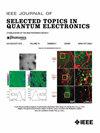对肥胖谈话的神经反应取决于体重:自然谈话中的近红外光谱研究
IF 5.1
2区 工程技术
Q1 ENGINEERING, ELECTRICAL & ELECTRONIC
IEEE Journal of Selected Topics in Quantum Electronics
Pub Date : 2025-03-26
DOI:10.1109/JSTQE.2025.3573919
引用次数: 0
摘要
肥胖谈话——对体重或身体的自我批评——很常见,尤其是在年轻女性中。它会导致身体形象问题,如身体监控和不满,但个人可能会通过摆脱肥胖话题而恢复过来。本研究旨在探讨脂肪谈话的神经机制,特别强调体重的调节作用。共有116名参与者参加了一场肥胖谈话,在谈话之前和之后,他们会讨论一些与身体无关的话题,比如分享旅行经历或讨论房间装饰。这些讨论分别被称为测试前和测试后会谈。在所有阶段,使用fNIRS连续记录额叶和顶叶区域的大脑活动。结果显示,身体质量指数(BMI)较高的参与者在脂肪谈话后身体监测增加,在测试后谈话后消退;这种模式在BMI较低的参与者中没有观察到。神经影像学结果显示,高BMI与肥胖谈话期间涉及身体相关认知控制的大脑区域的功能连通性下降有关,而在测试后谈话期间与情绪调节相关的大脑区域的连通性增加有关。相比之下,BMI较低的参与者在肥胖谈话期间和之后都表现出与身体监控相关的认知控制区域的连通性增强。这些发现表明,对肥胖谈话的不同神经和调节反应是基于体重的。本文章由计算机程序翻译,如有差异,请以英文原文为准。
Neural Responses to Fat Talk Depend on Body Weight: An fNIRS Study in Natural Conversations
Fat talk—self-critical comments about weight or body—is common, especially among young women. It leads to body image issues like body surveillance and dissatisfaction, but individuals might recover by disengaging from fat talk. This study aims to investigate the neural mechanisms underlying fat talk, with particular emphasis on the moderating role of body weight. A total of 116 participants took part in a fat talk session, which was preceded and followed by discussions on non-body-related topics, such as sharing travel experiences or discussing room decor. These discussions were referred to as the pre-test and post-test talks, respectively. Brain activity in the frontal and parietal regions was continuously recorded using fNIRS throughout all phases. Results showed that participants with higher Body Mass Index (BMI) reported increased body surveillance following the fat talk, which subsided after the post-test talk; this pattern was not observed in participants with lower BMI. Neuroimaging findings revealed that higher BMI was associated with decreased functional connectivity among brain regions involved in body-related cognitive control during the fat talk, and increased connectivity in regions associated with emotional regulation during the post-test talk. In contrast, participants with lower BMI exhibited enhanced connectivity in cognitive control regions related to body surveillance both during and after the fat talk. These findings suggest distinct neural and regulatory responses to fat talk based on body weight.
求助全文
通过发布文献求助,成功后即可免费获取论文全文。
去求助
来源期刊

IEEE Journal of Selected Topics in Quantum Electronics
工程技术-工程:电子与电气
CiteScore
10.60
自引率
2.00%
发文量
212
审稿时长
3 months
期刊介绍:
Papers published in the IEEE Journal of Selected Topics in Quantum Electronics fall within the broad field of science and technology of quantum electronics of a device, subsystem, or system-oriented nature. Each issue is devoted to a specific topic within this broad spectrum. Announcements of the topical areas planned for future issues, along with deadlines for receipt of manuscripts, are published in this Journal and in the IEEE Journal of Quantum Electronics. Generally, the scope of manuscripts appropriate to this Journal is the same as that for the IEEE Journal of Quantum Electronics. Manuscripts are published that report original theoretical and/or experimental research results that advance the scientific and technological base of quantum electronics devices, systems, or applications. The Journal is dedicated toward publishing research results that advance the state of the art or add to the understanding of the generation, amplification, modulation, detection, waveguiding, or propagation characteristics of coherent electromagnetic radiation having sub-millimeter and shorter wavelengths. In order to be suitable for publication in this Journal, the content of manuscripts concerned with subject-related research must have a potential impact on advancing the technological base of quantum electronic devices, systems, and/or applications. Potential authors of subject-related research have the responsibility of pointing out this potential impact. System-oriented manuscripts must be concerned with systems that perform a function previously unavailable or that outperform previously established systems that did not use quantum electronic components or concepts. Tutorial and review papers are by invitation only.
 求助内容:
求助内容: 应助结果提醒方式:
应助结果提醒方式:


